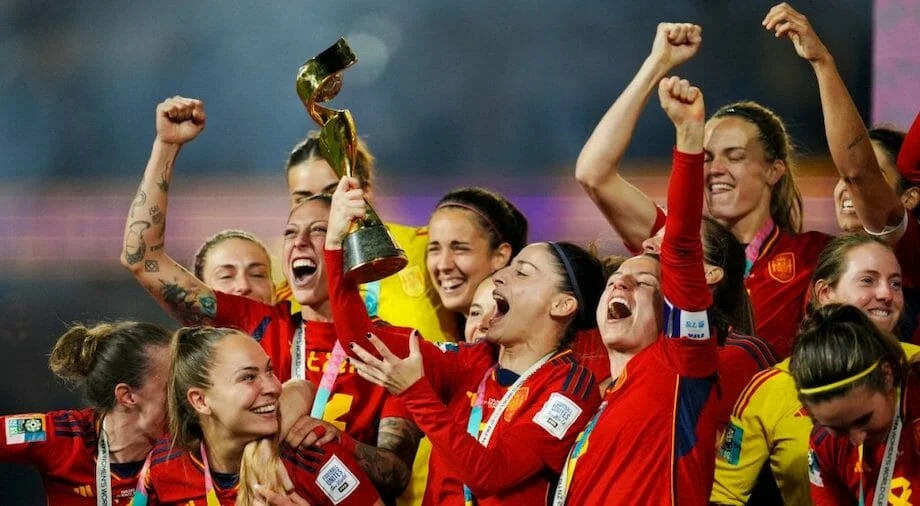Women’s Soccer Means Big Money on the World Stage

The United States losing in the World Cup may end up growing the sport globally. Having a new team, Spain, join the small club of nations that have won the FIFA Women’s World Cup is a good thing, even as the Americans lick their wounds and look ahead to fixing their issues before next year’s Summer Olympics.
Women’s soccer is no longer the exclusive domain of a few dominant countries, and it is no longer a niche sport being propped up by the Men’s World Cup.
The New Zealand-Australia jointly held tournament generated more than $570 million. “We didn’t lose any money,” said FIFA president Gianni Infantino. “We generated the second-highest income of any sport besides, of course, the men’s World Cup, at the global stage.”
In-person attendance at the event set a new record, shattering the old record by more than 600,000. Television ratings in the United States set new records for women’s soccer, in spite of the time difference. In the UK more than 12 million viewers watched England in the finals against Spain. That made it the second-most watched BBC television event of 2023, beating the Wimbledon men’s finals, and only trailing the coronation of King Charles.
When England played Australia in the semifinals, it was the most-watched television event in the history of Australia, peaking at a 90% share across the country.
Because of the great play by Australia, and the great support shown by Australia fans, the country’s government committed $200 million to improve women’s sports infrastructure
“This is only the start of a new era for sport in Australia,” said Anika Wells, Australia’s Minister for Sport. “The sleeping giant has awoken. In Australia, this FIFA Women’s World Cup has not just changed women’s football, it has changed women’s sport.”
New Zealand and Australia are so pleased with how hosting the tournament went that they are exploring a cohosting bid for the Men’s World Cup in 2034.
Hurdles for Smaller Federations
FIFA awarded the players in the tournament $110 million in prize money, with a minimum of $30,000 guaranteed for each player. But FIFA does not have the ability to pay the players directly, and must rely on each country’s federation to distribute the prize money.
Colombia has been accused of underpaying its players in the past, and as a team they earned $2.18 million at the World Cup. FIFPRO, the global players’ union for professional soccer players, is assisting Nigerian players who are each due $60,000 for this World Cup, and are still owed money dating back to 2021.
Jamaican players came out publicly against their federation and its lack of support and inadequate access to proper resources. They even resorted to crowdfunding, which raised more than $100,000 to help them prepare for the World Cup.
Nine nations played in this World Cup for the first time, and they will endure growing pains as they embrace the new normal when it comes to women’s sports and the popularity of soccer around the globe.
“We need to be ready, because after this, FIFA Women’s World Cup women’s football is going to explode in every single one of your countries,” said FIFA chief women’s football officer Sarai Bareman. “There will be millions and millions of women and girls around the world who will sign up to play football for the first time ever after this World Cup.
“Everyone needs to stand ready, with investment, with infrastructure, with coaches, with referees, with tournaments. We need to stand ready to receive that interest and retain it in our game in a sustainable way.”
Women’s Soccer at the Paris Olympics
There will be 12 teams competing at the 2024 Paris Olympics in women’s soccer, with four qualifying spots already taken. France is in as the host nation, the United States is in as the winner of the 2022 CONCACAF Champions, and Brazil and Colombia qualified during the 2022 Copa America.
But it’s worth noting that the United States lost in the round of 16, France was beaten by Australia in the quarterfinals, and Brazil didn’t get past the group stage for the first time since 1995. All of the powers have come back to earth, and women’s soccer is seeing the improvement of competitiveness around the world.
Four nations have won a gold medal in women’s soccer: the United States, Germany, Canada, and Norway. If any of those four are going to win it again, they will have to be considerably better than they were this last month.











